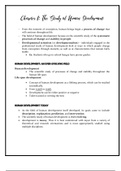Chapter 1: The Study of Human Development
− From the moment of conception, human beings begin a process of change that
will continue throughout life.
− The field of human development focuses on the scientific study of the systematic
processes of change and stability in people.
− Developmental scientists (or developmentalists) – individuals engaged in the
professional study of human development-look at ways in which people change
from conception through maturity as well as at characteristics that remain fairly
stable.
• Ex. Students who go to school hungry have poorer grades.
HUMAN DEVELOPMENT: AN EVER-EVOLVING FIELD
Human development
• The scientific study of processes of change and stability throughout the
human life span.
Life-span development
• Concept of human development as a lifelong process, which can be studied
scientifically.
• From womb to tomb.
• Development can be either positive or negative
• Toilet trained or wetting the bed.
HUMAN DEVELOPMENT TODAY
• As the field of human development itself developed, its goals came to include
description, explanation, prediction, and intervention.
• The scientific study of human development is ever-evolving.
• development is messy. Thus it is best understood with input from a variety of
theoretical and research orientations and is most appropriately studied using
multiple disciplines.
, DOMAINS OF DEVELOPMENT
Physical development
• Growth of body and brain, including patterns of change in sensory capacities,
motor skills, and health.
Cognitive development
• A pattern of change in mental abilities, such as learning, attention, memory,
language, thinking, reasoning, and creativity.
Psychosocial development
• A pattern of change in emotions, personality, and social relationships.
PERIODS OF LIFE-SPAN DEVELOPMENT
Social construction
• Division of the lifespan into periods.
• A concept or practice that may appear natural and obvious to those who accept it,
but that in reality is an invention of a particular culture or society.
− Ex. Until the early twentieth century, young people in the United States were
considered children until they left school, married or got a job, and entered
the adult world.
Typical Major Developments in Eight Periods of Human Development
• Prenatal Period (conception to birth)
− Germinal Stage
− Embryonic Period
− Feral Period
• Infancy and Toddlerhood (birth to age 3)
• Early Childhood (ages 3 to 6)
• Middle Childhood (ages 6 to 11)
• Adolescence (ages 11 to about 20)
• Emerging and Young Adulthood (ages 20 to 40)
• Middle Adulthood (ages 40 to 65)
• Late Adulthood (ages 65 and over)





